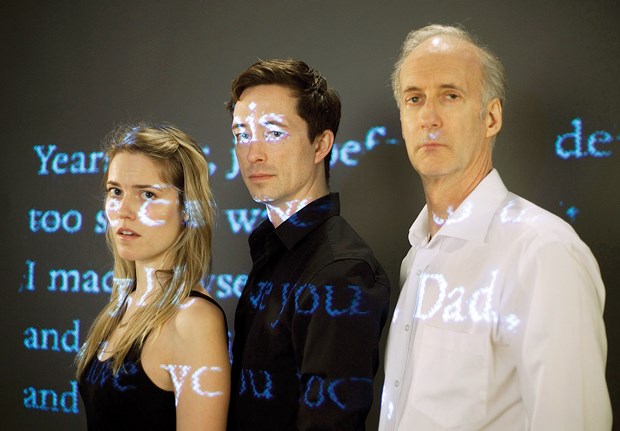Mother Tongue by Conrad Alexandrowicz. Texts adapted from published work by poets Lorna Crozier and Erin Mouré. Scotiabank Dance Centre, 677 Davie Street, May 14-18.
Conrad Alexandrowicz has an unusual job: he puts poetry into motion.
The director and choreographer is currently translating the poetry of Lorna Crozier and Erin Mouré into a performance that weds their words to physical movement. Exactly how you might describe that wedding is anyone's guess.
"I had another interviewer ask me what she would see on stage and I said, 'Well, that's pretty impossible to answer.' You have to be there," Alexandrowicz explains.
There is no theatre without being there, but the world premiere of Mother Tongue is so difficult to imagine you may need to be there just to confirm it exists.
In brief: two actors and six dancers will move and act and translate a series of poetic works to the stage.
"I had this idea that it would be really great to work with poetry as a resource for creating physical theatre," Alexandrowicz says during a break from rehearsals.
As an assistant theatre professor at the University of Victoria, Alexandrowicz is a colleague of Crozier, a writing professor at the school.
Alexandrowicz approached the poet at a faculty retreat and found she was enthusiastic about the idea of using her poetry to form a coherent story told through invented language and movement. Alexandrowicz elected to apply for a grant to further the work.
"Amazingly, I got the money," he says.
The choreographer had already been working with Mouré's poetry and decided the two wordsmiths' echoed back and forth from one to the other.
"In some ways because they're very different from each other," he says. The poets are distinct, but both have written work that deals with death.
The Poet's Dream, penned by Crozier, centres around a poet who is sucked inside her psyche. There are angels, memories, and mortality, specifically the death of parents.
Mouré's The Unmemntioable touches on some similar themes, albeit in a much different work. "I was really gripped by the story of her mother's family, the whole multiethnic strife in western Ukraine, which has a whole different resonance now, of course," Alexandrowicz says.
Both works deal with a primal sense of loss, according to Alexandrowicz. "Both my parents are gone, but my mom died in 2002. I guess it's because it's the kind of thing; you never get over it, you just get used to it."
Like two misfits who decide to be independent together, poetry and theatre belong together, according to Alexandrowicz. "Poetry has become a fringe art form the same way that dance and physical theatre are fringe art forms," Alexandrowicz says.
Alexandrowicz specializes in what he calls non-natural theatre. "It's not much different from staging a play except that the text is much more plastic," he explains. While iconic plays like Death of a Salesman have certain defining elements, Mother Tongue is still gathering elements to be defined.
The first rehearsals are the most difficult, according to Alexandrowicz. "There's always this really awkward period where the actors have to move and they have to hold scripts in their hand," he says. "It just felt like nothing was working."
Mouré's work ended up being more difficult to adapt, according to Alexandrowicz.
"Erin's work is really written more to be read. She uses the page much more," he explains, discussing the punctuation, fonts and deliberate misspellings that make up her poetry.
When the show is complete and each word and punctuation mark is embodied by movement, Alexandrowicz hopes the audience sees something powerful and redemptive about being mortal.
"I hope that they have some kind of confrontation with the mysteries about human life that can be conveyed in these art forms when they're fused."



